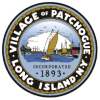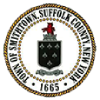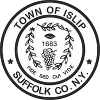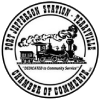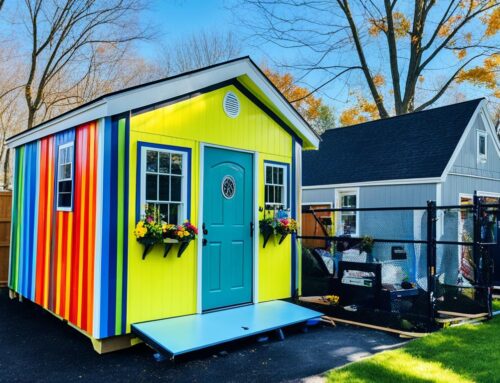Looking to start a construction project in Lynbrook, Long Island? It’s important to understand the key permits, variances, maps, and certificates of occupancy that you’ll need to navigate the process smoothly. The Village of Lynbrook Building Department oversees these requirements to ensure that construction work meets safety regulations and code compliance.
Whether you’re planning alterations or extensions to existing buildings, new construction, or installations like signs, awnings, fences, or swimming pools, building permits are essential. To get started, you’ll need to apply for a building permit through the Village of Lynbrook Building Department. Electricians and plumbers must also be licensed and registered with the village, and contractors must have proper insurance coverage.
In some cases, property owners may need to apply for variances if unique circumstances or hardships prevent strict compliance with local zoning laws. The Village of Lynbrook reviews and approves variance requests to ensure fairness and appropriate consideration of each case.
Radius maps play a crucial role in understanding the proximity of buildings and determining buffer zones, setback requirements, or spacing regulations. The Building Department may require the submission of radius maps as part of the permit application process.
Before your building can be legally occupied, you’ll need to obtain a certificate of occupancy. This document verifies that your construction or alterations comply with applicable building codes and are safe for occupancy. The Village of Lynbrook Building Department will conduct inspections to ensure compliance before issuing the certificate.
If you’re an electrician or plumber working in Lynbrook, it’s important to be licensed and registered with the village. Compliance with licensing requirements and proof of insurance is necessary to ensure the work is done by qualified professionals who meet the necessary standards.
The Village of Lynbrook Building Department also provides various outreach tools and resources to assist residents and contractors. These resources include foreclosure assistance, permit forms and applications, information on over occupancy housing, and links to relevant codes and regulations.
By working closely with the Village of Lynbrook Building Department and following the proper procedures and regulations, your construction project in Lynbrook can proceed smoothly and safely.
Key Takeaways:
- Building permits are required for most construction work in Lynbrook, including alterations, extensions, new construction, and installations.
- Property owners may need to apply for variances if strict compliance with zoning laws is not possible due to unique circumstances or hardships.
- Radius maps are used to determine distances between structures and help determine buffer zones, setback requirements, and spacing regulations.
- A certificate of occupancy is necessary before a building can be legally occupied and verifies compliance with building codes and safety standards.
- Electricians and plumbers working in Lynbrook must be licensed, registered, and comply with the village’s licensing requirements.
- The Village of Lynbrook Building Department offers various outreach tools and resources to support residents and contractors throughout the construction process.
Lynbrook Building Permits
In order to ensure construction projects in Lynbrook meet safety requirements and code regulations, building permits are required for various types of construction projects. This includes alterations or extensions on existing buildings as well as new construction.
When applying for a building permit in Lynbrook, the applicant must submit a detailed description of the proposed work, the estimated cost, and the full name and address of the owner and applicant. These permits play a crucial role in ensuring that construction work in the village is carried out in compliance with the necessary regulations.
Obtaining a building permit is an important step in the construction process, as it helps to ensure that the work being done meets the required standards. By obtaining the necessary permits, property owners can have the peace of mind that their construction projects are being carried out legally and in accordance with the regulations set forth by the Village of Lynbrook.
Benefits of Lynbrook Building Permits:
- Ensures compliance with safety requirements and code regulations
- Provides legal authorization for construction work
- Protects property owners and contractors
- Helps maintain the integrity of the community
Building permits serve as an important tool in ensuring that construction work in Lynbrook is carried out safely and in compliance with the necessary regulations. By obtaining the necessary permits, property owners can proceed with their construction projects knowing that they are in compliance with the laws and regulations set forth by the Village of Lynbrook.
| Building Permit Application Requirements | Documents Needed |
|---|---|
| Description of proposed work | Written description of the construction project |
| Estimated cost | Documentation showing the estimated cost of the project |
| Owner and applicant information | Full name and address of the owner and applicant |
Lynbrook Variances
In certain situations, property owners in Lynbrook may need to apply for variances from the local zoning laws. Variances are granted when there are unique circumstances or hardships that prevent strict compliance with these regulations. The Superintendent of Buildings and the Board of Trustees are responsible for reviewing and approving variance requests. It is important to note that variances are not guaranteed, and applicants must provide a compelling case for their request.
When applying for a variance in Lynbrook, property owners must submit a thorough application that includes detailed information about the hardship and the reasons why the requested variance is necessary. The application should explain how strict compliance with the zoning laws would result in practical difficulties or unnecessary hardships. It is essential to provide all relevant documentation and supporting evidence to strengthen the case for a variance.
The variance application will be reviewed by the Superintendent of Buildings and the Board of Trustees, who will carefully consider the unique circumstances presented. They will assess whether granting the variance aligns with the intent of the local zoning laws and whether it will have any adverse impact on neighboring properties or the community as a whole. The decision to grant a variance is ultimately based on a thorough evaluation of the facts and circumstances surrounding the request.
Obtaining a variance in Lynbrook can be a complex process, but it is essential to ensure compliance with zoning regulations. Property owners should consult with professionals familiar with local zoning laws and variance procedures to navigate the application process successfully. By providing a compelling case and demonstrating the need for a variance, property owners can increase their chances of obtaining approval for their construction or development projects.
Lynbrook Radius Maps
Radius maps play a crucial role in the construction process in Lynbrook. These maps are used to determine the distances between structures or areas, providing valuable information for builders, architects, and the Village of Lynbrook Building Department. By understanding the proximity of buildings and the placement of various features, construction projects can be planned and executed more effectively.
One of the main uses of radius maps is in determining buffer zones, setback requirements, or spacing regulations. For example, if a new building is being constructed, the radius map can help ensure that it meets the necessary setback requirements from neighboring properties or structures. This not only maintains a harmonious aesthetic but also ensures safety and compliance with local regulations.
When applying for building permits in Lynbrook, the Building Department may require the submission of radius maps as part of the application process. These maps provide visual documentation of the proposed construction’s impact on the surrounding area and assist in the evaluation and approval of permit requests. By including radius maps in the application, builders can provide a clear and comprehensive overview of the project.
Key Benefits of Lynbrook Radius Maps
- Help determine buffer zones, setback requirements, and spacing regulations
- Ensure compliance with local building codes and regulations
- Aid in evaluating and approving building permit applications
- Provide visual documentation of the construction’s impact on the surrounding area
- Assist in planning and executing construction projects more effectively
| Benefits | Description |
|---|---|
| Help determine buffer zones, setback requirements, and spacing regulations | Radius maps provide accurate measurements and visual representations of the distances between structures, helping builders comply with local zoning laws. |
| Ensure compliance with local building codes and regulations | By using radius maps, builders can ensure that their construction projects meet all necessary requirements, ensuring the safety and integrity of the buildings. |
| Aid in evaluating and approving building permit applications | Radius maps provide the Building Department with a clear understanding of the proposed construction’s impact on the surrounding area, facilitating the evaluation and approval of permit applications. |
| Provide visual documentation of the construction’s impact on the surrounding area | Radius maps visually depict the proposed construction’s proximity to neighboring structures, allowing for a comprehensive assessment of its impact on the surrounding area. |
| Assist in planning and executing construction projects more effectively | With the information provided by radius maps, builders can better plan and execute their construction projects, ensuring compliance with regulations and improving overall project efficiency. |
Lynbrook Certificate of Occupancy
In Lynbrook, a certificate of occupancy is a crucial document issued by the Village of Lynbrook Building Department. This certificate serves as verification that a building or structure complies with all applicable building codes and regulations, ensuring its safety for occupancy. Before a building can be legally occupied, property owners must obtain this certificate after completing construction or significant alterations. The Building Department conducts thorough inspections to ensure that the building meets all requirements before issuing the certificate of occupancy.
A certificate of occupancy is essential for property owners and occupants as it guarantees that the building is suitable and safe for use. It confirms that the construction work has been completed according to the approved plans and adheres to the necessary standards. This certification also demonstrates compliance with relevant building codes, ensuring the well-being of the occupants and the community.
Obtaining a certificate of occupancy in Lynbrook requires adherence to the proper procedures and documentation. Property owners should work closely with the Lynbrook Building Department to ensure that their building is inspected and meets all the necessary requirements. Once the inspections are successfully completed, the certificate of occupancy will be issued, providing peace of mind to property owners and ensuring the safety and compliance of the building.
Importance of Certificate of Occupancy
A certificate of occupancy holds significant importance for property owners, tenants, and the community. Here are some key reasons why obtaining this certificate is crucial:
- Legal Occupancy: A certificate of occupancy is essential for legal occupancy of a building. Without this certification, living or conducting business in a building may be in violation of local regulations.
- Safety Assurance: The certificate ensures that the building has undergone rigorous inspections, guaranteeing that it meets safety standards and regulations. This ensures the well-being of the occupants.
- Compliance with Building Codes: The certificate of occupancy confirms that the construction work has been completed in compliance with the approved plans and relevant building codes. It demonstrates the property’s adherence to the necessary regulations.
- Insurance and Financing: Many insurance companies and financial institutions require a certificate of occupancy before providing coverage or financing. This certificate validates the property’s legality and compliance, providing assurance to insurers and lenders.
By obtaining a certificate of occupancy, property owners in Lynbrook can ensure their buildings are legally compliant, safe for occupancy, and meet the necessary regulations. It is an essential step in the construction process, protecting the interests of both property owners and occupants.
| Key Points | Details |
|---|---|
| What is it? | A document issued by the Lynbrook Building Department to verify compliance with building codes and safety standards. |
| When is it required? | After completing construction or significant alterations. |
| Why is it important? | Ensures legal occupancy, guarantees safety compliance, and demonstrates adherence to building codes. |
Licensing Requirements – Electricians & Plumbers
In Lynbrook, electricians and plumbers who perform work within the village must meet specific licensing requirements and be registered with the Building Department. These requirements ensure that the work is carried out by qualified professionals who have the necessary skills and training to meet the village’s standards and regulations. Additionally, contractors must provide proof of insurance to protect both themselves and their clients during the construction process.
Obtaining a license as an electrician or plumber in Lynbrook demonstrates a commitment to professionalism and adherence to industry standards. It also provides assurance to property owners that the work will be completed safely and in compliance with local building codes. The licensing process typically involves an application, documentation of relevant experience and qualifications, and an examination to assess the applicant’s knowledge and competency.
Working with licensed electricians and plumbers in Lynbrook elevates the quality and safety of construction projects. It ensures that the electrical and plumbing systems installed in buildings meet all necessary requirements and are in line with best practices. Whether it’s installing new electrical wiring, repairing a plumbing issue, or conducting routine maintenance, licensed professionals bring expertise and accountability to their work.
The Importance of Licensing Requirements
“Working with licensed electricians and plumbers in Lynbrook elevates the quality and safety of construction projects.”
Without proper licensing, there may be increased risks associated with electrical or plumbing work. Unlicensed individuals may not have the necessary knowledge or training to identify potential hazards or ensure that installations are carried out correctly. This can result in safety issues, damage to property, and even legal complications.
By adhering to licensing requirements, Lynbrook emphasizes the importance of proper training, ongoing education, and professional accountability in the construction industry. This commitment to licensing helps safeguard the community and maintain high-quality standards for construction and renovation projects.
Licensing Requirements for Electricians and Plumbers in Lynbrook
Exact licensing requirements for electricians and plumbers in Lynbrook can be obtained from the Village’s Building Department. However, it is typically necessary to provide documentation of relevant experience and education, complete an application form, and successfully pass an examination. It is important for electricians and plumbers working in Lynbrook to stay updated on any changes to licensing requirements and comply with all regulations to ensure continued eligibility to perform work within the village.
Lynbrook Outreach Tools and Resources
The Village of Lynbrook Building Department offers a range of outreach tools and resources to assist both residents and contractors. These resources are designed to provide guidance and support throughout the construction process, ensuring that all procedures are followed correctly and in a timely manner. Whether you need information on permits, assistance with foreclosure issues, or access to relevant codes and regulations, the Building Department is here to help.
One valuable resource provided by the Building Department is foreclosure assistance. If you are facing foreclosure or need guidance on navigating the foreclosure process, the department can provide information and direct you to the appropriate resources. They can help you understand your rights and options, and work with you to find a solution to your housing situation.
The Building Department also offers a wide range of forms and applications for permits. These forms are available online and can be filled out and submitted electronically, making the permit application process more efficient and convenient. By providing these resources online, the department aims to streamline the application process and make it easier for residents and contractors to access the necessary documentation.
Additionally, the Building Department provides access to important information on over occupancy housing. This includes regulations and guidelines that must be followed to ensure the safety and well-being of residents in multi-unit dwellings. By providing this information, the department aims to promote safe and responsible housing practices within the community.
For more information and access to these valuable resources, visit the Village of Lynbrook Building Department’s website or contact their office directly. Whether you are a resident in need of assistance or a contractor looking for guidance, the Building Department is dedicated to providing the tools and resources you need for successful construction projects in Lynbrook.
Conclusion
Navigating the construction procedures in Lynbrook requires obtaining the necessary building permits, variances if needed, complying with radius maps, and obtaining a certificate of occupancy. It is essential to work closely with the Lynbrook Building Department to ensure that all necessary documentation and requirements are met. By following the proper procedures and regulations, construction projects in Lynbrook can proceed smoothly and safely.
At TracisPermits.com, we understand the importance of efficient and timely construction processes. We specialize in assisting property owners and contractors in Lynbrook with obtaining building permits, variances, radius maps, and certificates of occupancy. With our fast and reliable service, you can get the necessary approvals quickly to start your construction projects.
Contact us today at 631-492-0927 or visit our website for more information and assistance. Our team of experienced professionals is ready to provide the support you need to navigate the Lynbrook construction procedures and ensure compliance with building regulations. Trust TracisPermits.com for a hassle-free construction process on Long Island.
FAQ
What types of construction projects require building permits in Lynbrook?
Building permits are required for alterations or extensions on existing buildings, new construction, signs, awnings, fences, swimming pools, demolition, and more.
How do I apply for a building permit in Lynbrook?
Building permit applications must be submitted to the Lynbrook Building Department and should include a description of the proposed work, the estimated cost, and the full name and address of the owner and applicant.
When are variances needed in Lynbrook?
Variances are granted when there are unique circumstances or hardships that prevent strict compliance with local zoning laws. Property owners must apply for variances and provide details of the hardship and why the variance is necessary.
What are radius maps used for in Lynbrook?
Radius maps are used to determine distances between structures or areas. They are helpful in understanding proximity, buffer zones, setback requirements, or spacing regulations.
What is a certificate of occupancy and when is it required in Lynbrook?
A certificate of occupancy is a document issued by the Building Department that verifies a building complies with building codes and is safe for occupancy. It is required after completing construction or significant alterations before a building can be legally occupied.
Are electricians and plumbers required to be licensed in Lynbrook?
Yes, electricians and plumbers who perform work within the village must be licensed and registered with the Lynbrook Building Department.
What resources does the Lynbrook Building Department provide?
The Lynbrook Building Department provides various outreach tools and resources, including foreclosure assistance, forms and applications for permits, information on over occupancy housing, and links to relevant codes and regulations.
How can I contact the Lynbrook Building Department for more information?
For more information and assistance, you can contact the Lynbrook Building Department or visit their website.




